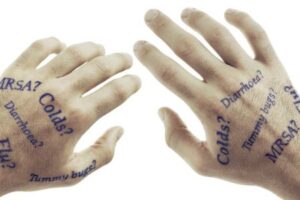I’ve been thinking a lot about television anchors and personalities. As they get older they encounter health issues, like the rest of us, and they get publicized because we think we know them so well. Is this helpful for our own health or does it sometimes go too far?
I’ve been thinking a lot about television anchors and personalities. As they get older they encounter health issues, like the rest of us, and they get publicized because we think we know them so well. Is this helpful for our own health or does it sometimes go too far?
 Lately, there have been rumblings of criticism of ABC News and the producers of top-rated “Good Morning America” because they have focused so much on the bone marrow transplant for myelodysplastic syndromes (MDS) of their affable anchor Robin Roberts. When Diane Sawyer and George Stephanopoulos were at her bedside on TV, veteran television critic Tom Shales said it was more about ratings and not about caring. I don’t agree. Showing human emotion is what makes television tick and it is certainly natural for Robin’s co-workers to want to be with her at a critical moment. Yes, more of us watch, but is that a bad thing? For example, now many thousands more Americans have been HLA typed and added to the registry of potential bone marrow donors. People are learning about blood cancers because of Robin’s cancer journey. In a time when government programs have few resources and public service announcements rarely get airtime, why can’t commercial television lend a hand with a compelling story that calls us to action?
Lately, there have been rumblings of criticism of ABC News and the producers of top-rated “Good Morning America” because they have focused so much on the bone marrow transplant for myelodysplastic syndromes (MDS) of their affable anchor Robin Roberts. When Diane Sawyer and George Stephanopoulos were at her bedside on TV, veteran television critic Tom Shales said it was more about ratings and not about caring. I don’t agree. Showing human emotion is what makes television tick and it is certainly natural for Robin’s co-workers to want to be with her at a critical moment. Yes, more of us watch, but is that a bad thing? For example, now many thousands more Americans have been HLA typed and added to the registry of potential bone marrow donors. People are learning about blood cancers because of Robin’s cancer journey. In a time when government programs have few resources and public service announcements rarely get airtime, why can’t commercial television lend a hand with a compelling story that calls us to action?
Sometimes there is little for us to do. In my hometown of Seattle, veteran local TV anchor Kathi Goertzen died this year from complications of acoustic neuroma, a tumor inside her skull. My interview with her years ago stays locked in my memory. Viewers followed her long trek through numerous surgeries and radiations. We learned about the illness and the unfairness of it all, but there was little we could do except pray for her and improved medical solutions. Yet awareness about serious health issues is a good thing. Maybe it leads to a viewer getting earlier detection for something that can be treated successfully; maybe it leads to someone taking basic preventive steps like quitting smoking, getting a pap smear or a colonoscopy.
I’ve never been a fan of Hollywood celebrities making money with million dollar contracts from Pharma to pay them for speeches or press tours. It just seems wrong. TV anchors sharing their story with us, their family of viewers, seems ok and can produce some good.
 One other point about TV anchors I wanted to share with you today, my 62nd birthday. I am back in the US to host our multiple myeloma town meeting in Columbus, Ohio and I have been watching morning network television as I get ready. I am thrilled to see a lot of older – post 60 – correspondents bringing us the big stories with their decades of wisdom and perspective – especially on CBS. And right in the middle of them is one of my idols – Charlie Rose – now 70 and still going strong with his insightful interviews. My goal this year is to be more like him and to find others to join me…providing insightful interviews specifically for people we serve with serious chronic conditions including, happily, more and more cancers that are truly “chronic” and not acutely fatal.
One other point about TV anchors I wanted to share with you today, my 62nd birthday. I am back in the US to host our multiple myeloma town meeting in Columbus, Ohio and I have been watching morning network television as I get ready. I am thrilled to see a lot of older – post 60 – correspondents bringing us the big stories with their decades of wisdom and perspective – especially on CBS. And right in the middle of them is one of my idols – Charlie Rose – now 70 and still going strong with his insightful interviews. My goal this year is to be more like him and to find others to join me…providing insightful interviews specifically for people we serve with serious chronic conditions including, happily, more and more cancers that are truly “chronic” and not acutely fatal.
As we age illness is more likely to rear its head. It happens to people regardless of their station in life. For those who are well known to us can their story legitimately help us all learn and improve our own health or the health of our community in the process? I think so. So today I miss Kathi, pray for Robin and appreciate her being so public, understand why it was natural and inspirational for Diane and George to be with their friend on network TV, and I’m going to work hard to be like Charlie, asking the right questions so we can all make better decisions about our health and feel more confident and in-control.
Wishing you and your family the best of health!
Andrew






